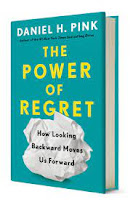Pink starts his analysis of regret by debunking the commonly professed “I have no regrets.” Of course, we have regrets and to not have them is to not feel, to not live. Regrets are what make it possible to connect with others – all of us wish that we hadn’t done some things or had done other things that we passed up. He goes on to explain how regrets make us better and identifies the core regrets with which we generally struggle. Then he closes with advice on how to deal with regret.
This book is not just an opinion piece; it is based on a worldwide regret survey that included both a tabulated survey and open-ended responses of what people around the world regretted. Before launching into his own research, Pink summarizes seventy years of previous research with two conclusions: 1) regret makes us human, and 2) regret makes us better. And regret is a uniquely human capability because we have the ability to travel across time in our memories and we can imagine different experiences that didn’t actually happen. We can see this easily in a common regret expressed in Pink’s survey – people wish that they had taken their educations more seriously, which they believe would have led to different life outcomes. In addition to mental time travel and imagining other outcomes, humans have the ability to compare their own experiences with others and they are inclined to place blame, either on themselves or others. An example in work is that we can regret following a parent’s advice in career choice, therefore blaming them when we’re stuck in a career or workplace that we dislike.
The four core categories of regret that research defined are; foundation regrets (failures to be responsible, conscientious, or prudent), boldness regrets (chances we didn’t take), moral regrets (behaving poorly, or compromising our goodness), and connection regrets (neglecting people who contribute to our wholeness). Pink provides numerous examples of each category and then offers strategies that are applicable to varying degrees across all four. The strategies are: 1) undo it, 2) "at least it," and then heal through 3) self-disclosing, 4) self-compassion, and self-distancing. Owning up to “regret, when handled correctly, offers three broad benefits. It can sharpen our decision-making skills. It can elevate our performance on a range of tasks. And it can strengthen our sense of meaning and connectedness” (p. 42).
This book is short and has some core wisdom to it. While it doesn’t really break boundaries it is the reframing that helps – reframing that allows us to accept the things in our past that sometimes nag us, learning from them, and choosing to do better in the future. Pink’s book is worth a quick read for anyone in leadership, since leadership regrets are common for those who have attempted anything of note, or perhaps taken on a challenge that could have made a lot of difference in our lives.

No comments:
Post a Comment